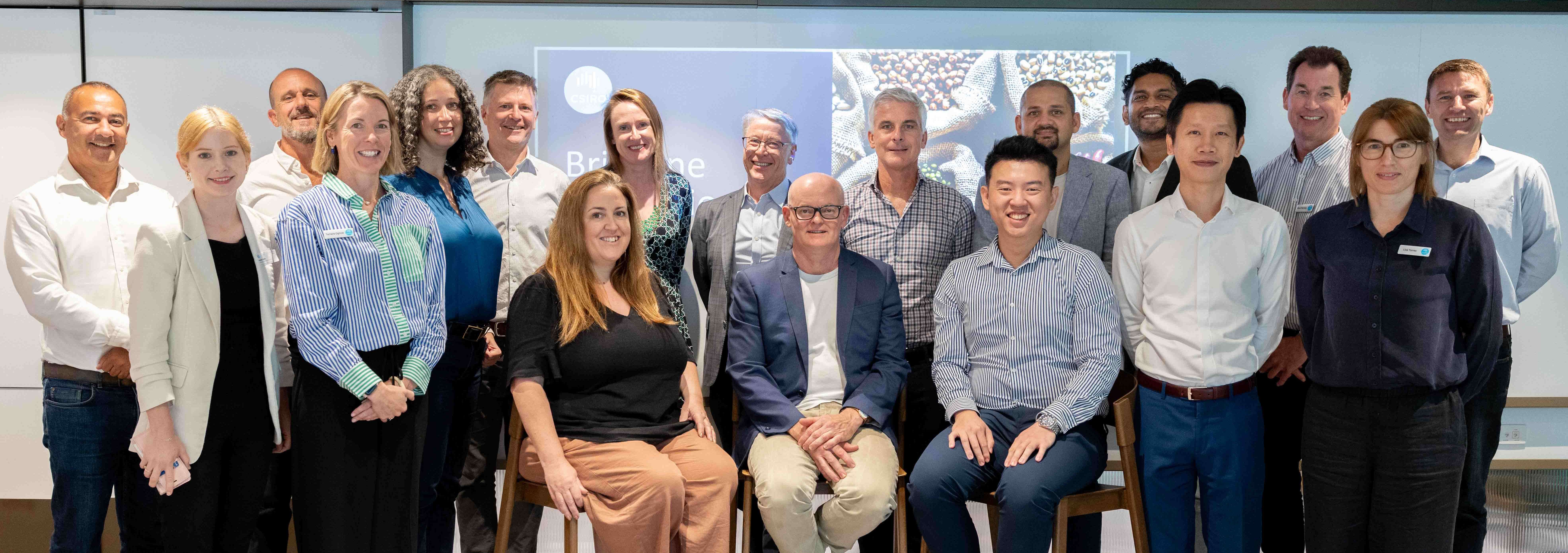
From the Director: February update
Last week, I attended evokeAG in Brisbane, along with Anne-Sophie Dielen (AFII Senior Manager Industry Engagement) and four ANU students. evokeAG is an annual event where industry, government and research institution stakeholders come together to explore and debate innovations in the agrifood sector. The event was a great opportunity to connect, learn and contribute to debates that are shaping the future of the agrifood sector in Australia and beyond.
Building a future agrifood workforce
One of the key areas discussed in roundtable discussions was the need to attract new talent and ideas into the agrifood workforce. Recognising this need, AFII continues to support delivery of the Master of Science in Agricultural Innovation. Unlike traditional agricultural programs, this degree has students undertaking courses from across the discipline spectrum at ANU – including environmental management, business, computer science, biology, engineering and systems modelling. The program enables students to gain a deep understanding of the challenges faced by the agrifood sector, and explore ways to use knowledge from different disciplines to address those challenges.
A key aspect of the Master in Agricultural Innovation program is creating opportunities for students to have direct exposure to industry, be it through placements and internships or by attending industry events. It was with the latter in mind that AFII sponsored several students from diverse discipline backgrounds (anthropology, engineering, policy and science communication) to attend evokeAG 2025. Our goal in taking students to evokeAG was to enable them to learn about the challenges facing the agrifood sector, explore ways in which their discipline knowledge might be needed to address those challenges, and ultimately get them to consider a career in the agrifood sector. Each student was a great ambassador for their discipline and the wider ANU community. You can learn more about the students’ experiences at evokeAG here.
The role of university R&D in supporting the ag sector
A key area of debate at evokeAG was the role that university R&D plays in addressing industry and societal challenges. Using ‘you can’t ask that’ style panel discussions, the event provided an opportunity for a diverse range of opinions to be raised, with many in the audience posting comments that questioned whether universities are doing their part to fully address the challenges facing the sector. This critique parallels other debates on university funding, loss of trust and social licence, and universities not playing a strong enough role in helping drive innovation. These debates are not unique to Australia, with similar issues emerging in NZ, UK, Canada and USA. For me, one of the key ways to address these issues is through initiatives that harness the full interdisciplinary capabilities of universities to address complex industry, societal and environmental challenges. ANU innovation institutes – including AFII and the ANU Institute for Space – are examples of the university sector recognising the need for researchers to work differently with industry and government agencies. At AFII, this means investing in initiatives that help researchers to better understand the needs of industry, and to create a space where researchers and industry can co-define challenges and co-design solutions. You can find examples of the exciting initiatives that AFII has enabled in our 2024 Highlights. Thus, if you have an industry challenge that is complex and cannot be addressed in-house, contact us.
CSIRO Venture Exchange Program
While in Brisbane, I was pleased to contribute to a CSIRO Venture Exchange Program (VEP) Overseas Market Entry Panel discussion. Attending the event was one of the VEP participants, PPB Technology, an AFII Hub member. The panel discussion was facilitated by Tamara Ogilvie. Tamara is a Program Director at CSIRO, with responsibility for initiatives and programs that support start-ups and international stakeholder engagement. Also on the panel were Haley Laraghy (Principal Trade and Investment Advisor, Trade and Investment Queensland), Amelia Fyfield (Director South East Asia, CSIRO) and Chris Vas (General Manager, Food Innovation Precinct, WA). The discussion focused on strategies for establishing new relationships with overseas partners, be them businesses, government agencies or R&D entities. Drawing on my experiences over the past six years leading AFII, I outlined what I see as important elements in building trust with, and deriving value from, overseas entities.
The impacts of extreme heat on agrifood systems
Earlier in the year, I visited collaborators at the NASA Goddard Space Flight Center to discuss collaborations on how we can use Earth observation technologies – drones, fixed-wing planes and satellites – to monitor impacts of extreme heatwaves on agrifood systems. The goal of the talks was to identify ways that Australian researchers could ground-truth the impacts of extreme heatwaves on food production landscapes at the same time as NASA EO sensors are flying over selected sites. I also used the USA visit to discuss a future international symposium – likely to be held at the Desert Botanical Gardens in Phoenix, USA in 2026 – on the impacts of extreme heat on terrestrial landscapes. If you would like to know more about these and other initiatives, please reach out to me at agrifood@anu.edu.au
Come and join us!
Finally, we still have some office and lab spaces in the Agrifood Hub – thus, if you have a business with an agrifood focus that would benefit from unique access to ANU researchers and infrastructure to support your R&D and growth, please get in touch with the AFII team at agrifood@anu.edu.au. We also welcome interest from businesses headquartered outside Australia with an interest in being based at ANU, in our nation’s capital.
